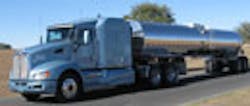The Commercial Vehicle Safety Alliance (CVSA) and Advocates for Highway and Auto Safety (Advocates) fired the opening salvo this week in a joint campaign to repeal statutory hours-of-service (HOS) exemptions for agriculture and utility truck drivers. The groups seek to have those HOS exemptions replaced with regulatory-based ones to more closely monitor safety performance of such fleets and make the fleets re-apply for them on a periodic basis.
"We are sensitive to the fact that the agricultural and utility industries are vital to the fabric of our daily lives, and we need to ensure that the regulations applied to them are appropriate and sound," wrote Stephen Campbell, CVSA's executive director, and Jacqueline Gillan, vp of Advocates, in a joint letter to the ranking House members of the Transportation & Infrastructure committee.
"However, these industries operate trucks and other types of vehicles just like over-the-road trucking companies, and the safety of their vehicles and drivers are no less important than those being operated by the long-haul or regional less-than-truckload trucking companies," they said.
The Commercial Vehicle Safety Alliance (CVSA) and Advocates for Highway and Auto Safety (Advocates) fired the opening salvo this week in a joint campaign to repeal statutory hours-of-service (HOS) exemptions for agriculture and utility truck drivers. The groups seek to have those HOS exemptions replaced with regulatory-based ones to more closely monitor safety performance of such fleets and make the fleets re-apply for them on a periodic basis.
"We are sensitive to the fact that the agricultural and utility industries are vital to the fabric of our daily lives, and we need to ensure that the regulations applied to them are appropriate and sound," wrote Stephen Campbell, CVSA's executive director, and Jacqueline Gillan, vp of Advocates, in a joint letter to the ranking House members of the Transportation & Infrastructure committee.
"However, these industries operate trucks and other types of vehicles just like over-the-road trucking companies, and the safety of their vehicles and drivers are no less important than those being operated by the long-haul or regional less-than-truckload trucking companies," they said.
Not surprisingly, the Agricultural and Food Transporters Conference (AFTC) is against repealing the statutory HOS exemptions due to the unpredictably of the market their members serve as well as the difficulties inherent with reapplying for such exemptions on a continual basis.
"The flexibility needed for planting and harvesting crops is so critical, it's a must-have for the agricultural sector to work efficiently," Russell Laird, AFTC executive director, told FleetOwner. "We also think the proposal to require the [HOS] exemption to go through the regulatory process is merely a cute way to kill the exemption. Historically, the agency in charge [Federal Motor Carrier Safety Administration] has denied far more HOS exemption applications than they approve."
CVSA contends that the reason the statutory HOS exemption must be repealed hinges on safety performance for trucks and drivers in the agriculture and utility segments.
Between 2005 – when the exemptions were codified into law by Congress – and 2007, the U.S. Department of Transportation's Volpe National Transportation Systems Center found that agricultural carriers operating exclusively within a 100-mile radius under the exemption had a 19% higher crash ratethan agricultural carriers operating outside that radius. The Volpe Center's study also found that the utility service vehicle drivers' crash rate had increased by 40% during the same two-year period.
"Our concern is that crashes and out-of-service rates for vehicles and drivers have increased in [these sectors] since this exemption has been in place," Steve Keppler, CVSA director of policy & programs, told FleetOwner. "That's the wrong direction in terms of highway safety."
AFTC's Laird, however, doesn't believe the Volpe Center's study adequately analyzes the safety picture. "We don't take safety issues lightly in this industry, but we also think they're jumping to conclusions here, saying their crash data – which we think may be suspect – indicates a lack of HOS compliance."
He pointed out that AFTC recently published a Manager's Guide to Safe Trucking During Agricultural Planting and Harvest Season to help agricultural haulers develop active strategies to improve safety during peak times of production, focusing on driver hiring decisions and communication with drivers as well as monitoring and managing fatigue.
"Agriculture doesn't run on a set schedule – weather patterns remain unpredictable," added Laird. "There's a lot of 'hurry up and wait' in this trucking sector. So we need the flexibility of an HOS exemption to compensate for that."
About the Author
Sean Kilcarr
Editor in Chief
Sean Kilcarr is a former longtime FleetOwner senior editor who wrote for the publication from 2000 to 2018. He served as editor-in-chief from 2017 to 2018.
